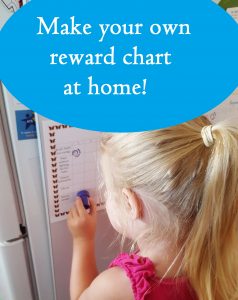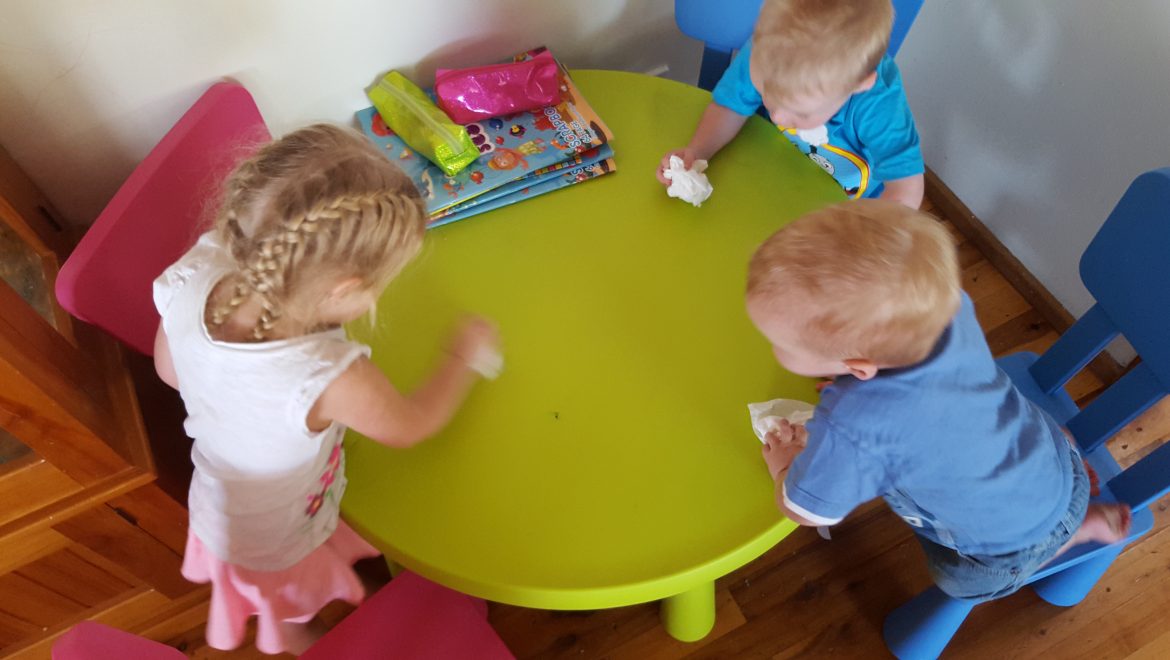Children helping around the house (aka “chores”) often comes with mixed opinions from parents.
I even have mixed opinions – I have a 3 year old and 2 year old twins so “helping” rarely means they are actually helping!
Toddlers helping around the house might mean:
- It takes twice as long to get things done
- It can cause fights over who is going to pick up which piece of dirty washing to put in the washing machine
- You may have to redo part of the task when they leave the room
BUT – there are positives too ….
- If they are “helping”- then they can’t be destroying any other part of the house
- It will mean you are instilling life long practices that might mean you can have a tidy house one day
- As they get older they will actually save you time
- It can help their co-ordination, balance & strength
- It can help to develop their organisation & planning skills
- It can help to develop their memory & ability to follow multi step instructions
- It can expand the language and vocabulary too
The reality is that there are HUGE benefits to your child’s development.
Children need responsibility and they need to be completing physical chores to help their development!
The table below is a summary of what age you can expect children to do start to do the task and why it is of benefit to them (developmentally).
Parents often say to me “I like doing things for my child, I love them and I want to do it for them.” – That is lovely and I do understand (especially when it is your youngest and you are starting feel less needed). But I can assure you that by doing everything for your child you are in fact limiting their learning potential, not helping them. When your children go to school they are expected to do most things for themselves, they need to have appropriate muscle development, planning and organisational skills – all of which can be developed by helping you around the house!
Remember that when you are doing anything with your children to talk to them, describe your actions, describe why you are doing it, how you are doing it and ask them questions about it as well. For example if you are sweeping the floor together, say to them “Wow we are sweeping the floor together, I am sweeping near the table and you are sweeping near the lounge.” “You are doing a great job at sweeping – you can sweep forwards – Now let’s try to sweep backwards! – great job.” This will help to stimulate their language and their development of action words, descriptive words etc. It will also help to keep their attention.
When my twins were 18 months we introduced stamp charts for helping around the house! It isn’t enforced – as I do not believe in punishment for not doing them at this age – they are just encouraged and it is amazing how encouraging a stamp can be!
Kids LOVE stamps (and the act of giving themselves a stamp on a boxed chart is a great hand eye co-ordination task itself).

So if you have young children please engage them in tasks around the house WITH you, children learn by watching and imitating so encourage it while they still want too – My mum once told me “kids are always eager to ‘help’ until they actually CAN help – then they don’t want to anymore” but embrace their eagerness while they are young!
| Task | Age to begin | Why is it good for them? |
| Packing away toys | 9 months | Hand eye co-ordination Motor planning General organisational skills Understanding words and naming objects |
| Dressing | Start to help -9 months Complete independently- 4 years | Balance Proprioception(knowing where their body is in space) Responsibility Problem solving Planning Learning body parts |
| Cooking | 12 months (Adult supervision) | Upper body strength Sequencing Following instructions Fine motor control Understanding procedures |
| Wiping up spills | 12 months | Upper body strength Hand strength Midline crossing Balance |
| Sweeping/raking leaves | 18 months (adult supervision) | Upper body strength Midline crossing Core strength Understanding action words |
| Pack away the washed dishes | 18 months (plastic) | Visual skills Hand eye co-ordination Spatial awareness Understanding action words Understanding prepositions eg. In, on, under Following instructions |
| Vacuuming | 2 years (adult supervision) | Upper body strength Midline crossing Core strength |
| Making bed | 2 years | Upper body strength Motor planning Spatial awareness |
| Cutting up their own food | 3 years | Bilateral control Hand strength Upper body strength Hand eye co-ordination |
| Setting the table | 3 years | Spatial awareness Organisation Memory Planning |
| Hanging the clothes out | 3 years (adult supervision) on a ground airer or short clothes line | Pincer strength In hand manipulation Upper body strength Upper body endurance |
| Folding and Putting clothes away | Putting away – 18 months Folding – 3-4 | Organisational skills Bilateral control planning Memory Upper body control Understanding prepositions eg. In, on, under |
| Feeding the pets | The age is dependent on the pet you have. (adult supervision) | Responsibility Memory Planning Time Management Language stimulation |

